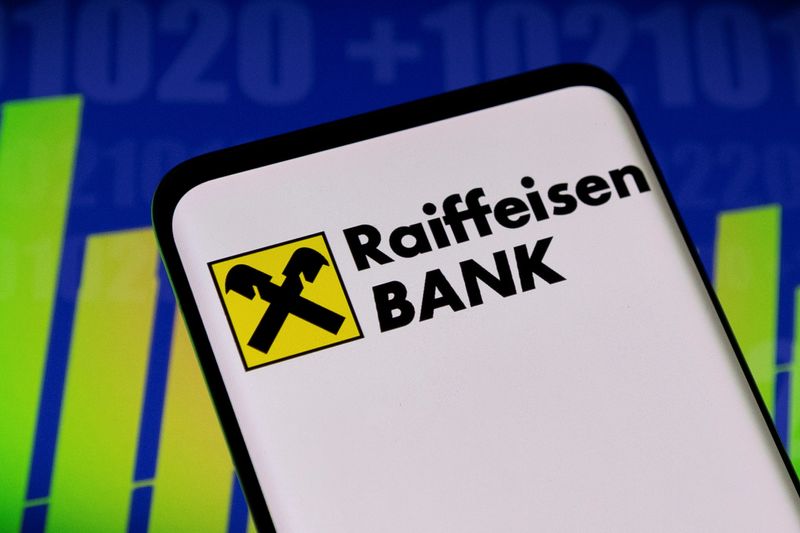Exclusive-Austria stalls Russian sanctions over Raiffeisen blacklisting – sources
2023.12.14 12:30

© Reuters. Raiffeisen logo and stock graph are seen displayed in this illustration taken, May 3, 2022. REUTERS/Dado Ruvic/Illustration/File Photo
By John O’Donnell
FRANKFURT/BRUSSELS (Reuters) -Austria is seeking to have Raiffeisen Bank International, the biggest Western bank in Russia, struck off a Ukrainian blacklist in return for signing off fresh European Union sanctions on Russia, said two people familiar with the situation.
Austria and the bank wants it to be taken off a Ukrainian list dubbed “international sponsors of war” – which sets out to shame companies doing business in Russia and supporting the war effort by, for instance, paying taxes.
The latest push underscores Austria’s deep economic bond with Russia, the bank’s determination to keep its profitable business there, as well as a fading wider Western drive to isolate Moscow.
Earlier in October, Austria’s foreign minister, Alexander Schallenberg, openly criticised that blacklist as arbitrary at a meeting of European ministers in Kyiv, said one person briefed on those discussions.
Raiffeisen is the only Austrian company on the list.
Austrian officials have flagged their concern about the list in Brussels, including at meetings of EU officials and diplomats in recent weeks, said three people with knowledge of the matter.
Bank envoys also met representatives of Ukraine’s National Agency of Corruption Prevention, which draws up the list, to discuss how to get the group off it, people familiar with the matter said.
Some companies have been taken off the list, including Hungary’s OTP Bank, a move that irked Austrian officials and the bank.
“We find it unfair that we are on the list,” said a spokesperson for the bank.
A spokesperson for the Austrian chancellery said that legal documents concerning the EU sanctions had been presented on Tuesday, declining to comment further.
Although Austria publicly supports Ukraine, several officials who spoke to Reuters have said they were reluctant to completely sever decades-old ties with Russia, thinking it will still be possible to restore relations.
Raiffeisen’s presence underlines the depth of relations between Austria and Russia, which maintain close ties through Russian gas pipelines and finance, with Vienna a hub for cash from Russia and its former Soviet neighbours.
Although the blacklist does not have any legal standing, it reinforces public pressure on Raiffeisen to quit Russia, something the bank is said it is willing to do but which has yet to happen.
Ukraine’s Western allies have poured billions of dollars of financial and military aid into Ukraine and backed sweeping sanctions against Russia, but more than 21 months into the war Kyiv is now finding it harder to keep this staunch backing.
Kyiv hopes to secure two major aid packages from the United States and European Union for next year, but both packages have encountered political resistance and become bogged down in debate.
Raiffeisen’s presence in Russia has proved divisive within its management as well as among the regional Landesbanks that control the group, with some advocating it leaves.








